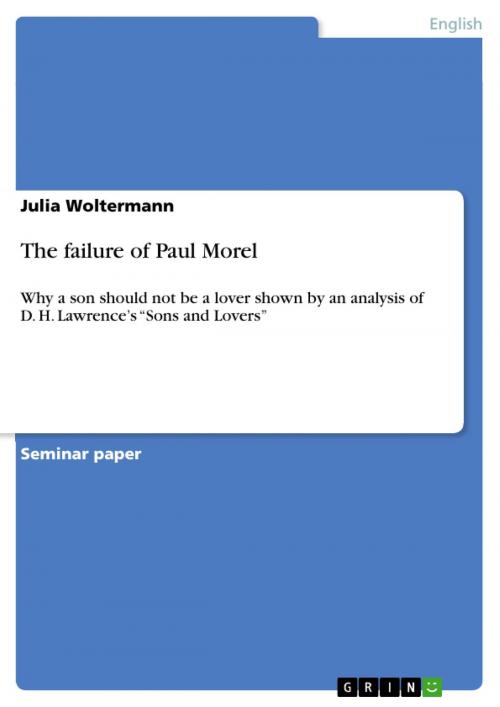The failure of Paul Morel
Why a son should not be a lover shown by an analysis of D. H. Lawrence's 'Sons and Lovers'
Fiction & Literature, Literary Theory & Criticism, British| Author: | Julia Woltermann | ISBN: | 9783656269922 |
| Publisher: | GRIN Verlag | Publication: | September 10, 2012 |
| Imprint: | GRIN Verlag | Language: | English |
| Author: | Julia Woltermann |
| ISBN: | 9783656269922 |
| Publisher: | GRIN Verlag |
| Publication: | September 10, 2012 |
| Imprint: | GRIN Verlag |
| Language: | English |
Seminar paper from the year 2006 in the subject English Language and Literature Studies - Literature, grade: 2,3, Friedrich-Alexander University Erlangen-Nuremberg (Institut für Anglistik und Amerikanistik), course: Proseminar, language: English, abstract: 1.Introduction In his foreword for Sons and Lovers, Lawrence compares the relationship between men and women with bees and hives. He introduces an idea at the end of that text that describes one of the most essential statements about the book and about what he has apparently learned. He says that when a man is too different from a woman and does not respect her, the woman can deport the man 'as a drone'1. If she does not find a better man now, they are both ruined: 'And she, either her surplus shall wear away her flesh, in sickness, or in lighting up and illuminating old dead Words, or she shall spend it in fighting with her man to make him take her, or she shall turn to her son, and say, 'Be you my Go-between.' But the man who is the go-between from Woman to Production is the lover of that woman. And if that Woman be his mother, then is he her lover in part only: he carries for her, but is never received unto her for his confirmation and renewal, and so wastes himself away in the flesh. The old son-lover was ?dipus. The name of the new one is legion. And if a son-lover takes a wife, then is she not his wife, she is only his bed. And his life will be torn in twain, and his wife in her despair shall hope for sons, that she may have her lover in her hour.'2 In my analysis I will describe how the main character of this book, Paul Morel, grows up to become such a son-lover of his mother's and how this affects his love and life. As one can see from this foreword, Lawrence knew about the story of Oedipus which describes a phenomenon Freud's psychoanalytic approach about the relationship between mothers and sons referred to. He called this the 'Oedipus complex'. Lawrence states that a man who is like Oedipus can not have a proper marriage. His wife cannot be a full part of his love, because the husband is not able to transfer the feeling of love from his mother to his wife. During his life, Paul experiences the difficulties in the contact with women he feels attracted to and whom he has relationships with. 1 Helen and Carl Baron, D. H. Lawrence, Sons and Lovers (Cambridge, 1994): 472. (im Weiteren als SL zitiert). 2 SL, 473.
Seminar paper from the year 2006 in the subject English Language and Literature Studies - Literature, grade: 2,3, Friedrich-Alexander University Erlangen-Nuremberg (Institut für Anglistik und Amerikanistik), course: Proseminar, language: English, abstract: 1.Introduction In his foreword for Sons and Lovers, Lawrence compares the relationship between men and women with bees and hives. He introduces an idea at the end of that text that describes one of the most essential statements about the book and about what he has apparently learned. He says that when a man is too different from a woman and does not respect her, the woman can deport the man 'as a drone'1. If she does not find a better man now, they are both ruined: 'And she, either her surplus shall wear away her flesh, in sickness, or in lighting up and illuminating old dead Words, or she shall spend it in fighting with her man to make him take her, or she shall turn to her son, and say, 'Be you my Go-between.' But the man who is the go-between from Woman to Production is the lover of that woman. And if that Woman be his mother, then is he her lover in part only: he carries for her, but is never received unto her for his confirmation and renewal, and so wastes himself away in the flesh. The old son-lover was ?dipus. The name of the new one is legion. And if a son-lover takes a wife, then is she not his wife, she is only his bed. And his life will be torn in twain, and his wife in her despair shall hope for sons, that she may have her lover in her hour.'2 In my analysis I will describe how the main character of this book, Paul Morel, grows up to become such a son-lover of his mother's and how this affects his love and life. As one can see from this foreword, Lawrence knew about the story of Oedipus which describes a phenomenon Freud's psychoanalytic approach about the relationship between mothers and sons referred to. He called this the 'Oedipus complex'. Lawrence states that a man who is like Oedipus can not have a proper marriage. His wife cannot be a full part of his love, because the husband is not able to transfer the feeling of love from his mother to his wife. During his life, Paul experiences the difficulties in the contact with women he feels attracted to and whom he has relationships with. 1 Helen and Carl Baron, D. H. Lawrence, Sons and Lovers (Cambridge, 1994): 472. (im Weiteren als SL zitiert). 2 SL, 473.















